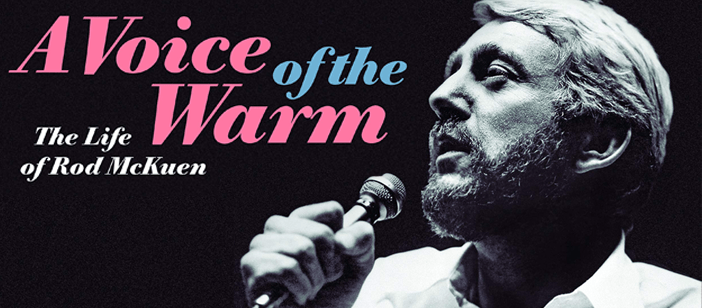From the Publisher: “In his 1960s-1970s heyday, Rod McKuen was a phenomenally popular singer-songwriter as well as the bestselling poet in publishing history. To his legions of fans around the world, he was a voice of compassion and healing, as much a prophet as an author/entertainer. McKuen songs like ‘If You Go Away’ and ‘Jean’ earned him massive hits, while books like Listen to the Warm sold millions of copies.
McKuen’s huge sales and devoted following didn’t stop the critics from calling his work sentimental kitsch cranked out for the money. Who was this enigmatic artist who aroused so much love and hatred? A Voice of the Warm: The Life of Rod McKuen is the first-ever biography of one of the 20th century’s most popular and misunderstood pop-culture icons. Drawing upon extensive research and over 100 interviews, author Barry Alfonso tells how McKuen overcame childhood physical and sexual abuse to become a teenage radio host, film actor, and Beat-style poet before connecting with a vast audience as a writer and recording artist. McKuen’s role as a pioneering gay rights activist who bridged the ’60s generation gap with a message of love and tolerance help to make his story uniquely relevant today.”
About the Author: Barry Alfonso grew up in San Diego, California, where he began his career as a music journalist for publications like the Los Angeles Times, LA Weekly, and Rolling Stone. He wrote songs for the films All the Right Moves (starring Tom Cruise) and Two of a Kind, as well as Pam Tillis’ number-one country hit “In Between Dances.” He received a 2004 Grammy nomination for the liner notes to the Peter, Paul and Mary box set, Carry It On. He has been a Pittsburgh resident since 2001.
Don’t Miss Out: Alfonso will be visiting Riverstone Books on July 12!
 From the introduction to A VOICE OF THE WARM: THE LIFE OF ROD McKUEN by Barry Alfonso (Backbeat Books, 2019):
From the introduction to A VOICE OF THE WARM: THE LIFE OF ROD McKUEN by Barry Alfonso (Backbeat Books, 2019):
McKuen is the Odd Man Out in the history of American pop culture. Music encyclopedias almost never included him even though he released albums for over 40 years. Surveys of contemporary literature overlooked him despite (or perhaps because of) his enormous sales. Rod’s work as a musician and poet didn’t lend themselves to easy categorization. Over the decades, he was associated with the San Francisco beat poet scene, the Twist dance craze of the early ’60, the folk revival, the Great American Songbook school of pop, the early days of New Age environmental recordings and 20th Century classical music. Yet none of these genres or movements claim him as even an adjunct member. He remains sui generis by his own choice or otherwise.
His fans didn’t care. Try to see him as they saw him at the height of his fame: a rumpled, slightly stooped 30-ish man with lemon frosting-colored hair ambling into the spotlight to the sound of orchestral fanfare. Inevitably, he is dressed in a sweater, jeans (or chinos) and high-topped sneakers – no amount of success could change his outfit. There’s a laid-back cowboy charm about him, as well as the romantic melancholy of a French cabaret singer. He laughs bashfully, gives wistful sideways glances, rises from quiet murmurs to emotional crescendos. Now close your eyes and hear his voice – hoarse, pitted, compelling in its imperfection. It adds to his pathos and his sexiness.
That voice could be clearly heard on the printed page as well as live and on record. He wrote about commonplace things, ordinary scenes, passing incidents and moods. McKuen seemed to be whispering in your ear however you took in his words. His unabashed nostalgia for old-fashioned pleasures like butterflies in the summertime and snowy Christmas mornings contrasted with his frank celebrations of a lover’s thighs or the soft glow of a post-coital reverie. On albums like Lonesome Cities and in books like Listen to the Warm, Rod found a way to make an erotic encounter in a steamy back room seem as wholesome as a basket of puppies or kite flying on a windy hillside.
Excerpted from A Voice of the Warm: The Life of Rod McKuen by Barry Alfonso. This excerpt is published here courtesy of the author and publisher and should not be reprinted without their permission.

























